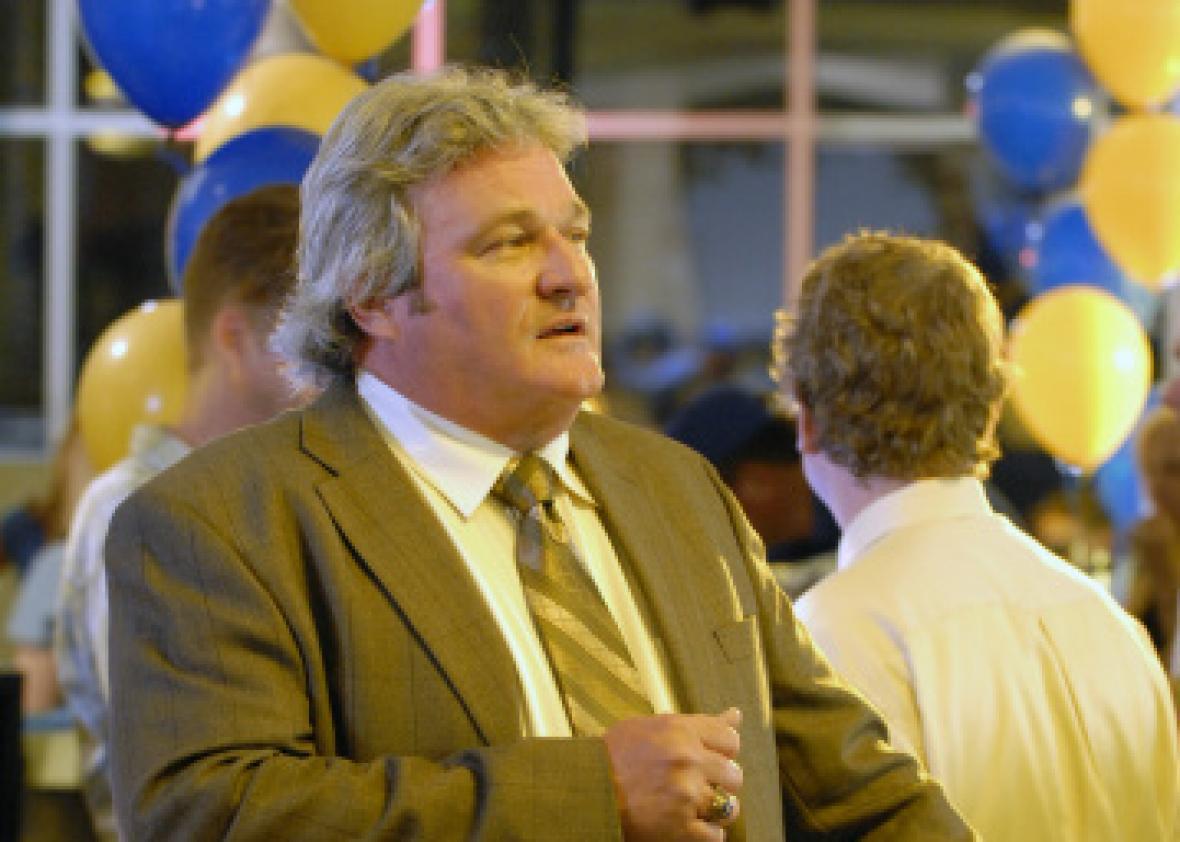I have been thinking about, of all people, Buddy Garrity. Buddy Garrity was a supporting character on the great Friday Night Lights, the television show about a small Texas town and its beloved high school football team. Buddy was a blowhard car salesman, a business leader who thought he knew it all, and appeared early in Friday Night Lights as a kind of villain, an aggravating former quarterback throwing his money and weight around. But Buddy soon became more sympathetic. Yes, he was a bloviating self-aggrandizer who always thought he was right, but he was also loyal, good-humored, and well-meaning, a pain in the ass, sure, but a lovable, irascible pal. I have been thinking about Buddy Garrity because he has been comforting me. I think he would have voted for Trump.
I have also been thinking about whether Veronica Mars’ fey Romeo, Logan Echolls, could be a possible Trumpist and whether FNL’s venerable Coach Taylor, who would not have voted for Trump, really would have voted for Hillary. I have been imagining that these fictional characters have (to me) objectionable politics because I somehow find it soothing. Despite their positions, I can still imagine having a laugh or a perfectly courteous exchange of pleasantries with them. They do not really want vile and awful things to happen to our country, even if they have facilitated vile and awful things happening to our country. They are wrong, but they still seem like compatriots.
At this moment it is hard to say the same about my nonfictional fellow Americans. This election has underscored the cliché that we are two Americas, living in the same house but not speaking. Before the election, Trump voters told reporters they were sure they were going to win, because look around them, they were part of a movement—how could they not? Meanwhile, Hillary voters thought the same thing. We didn’t have massive rallies, but everyone we knew, everything that we read, our Facebook feeds, every poll we saw agreed: He would not win. Trump’s victory has turned Hillary voters into strangers in our own land. How is it that we share a country with people who are so completely different from us, who have such different values, perspectives, and priorities as to be completely alien? It’s a feeling of displacement compounded by the fact that it is entirely possible, as a Hillary voter living in a nonswing state, that you could know absolutely no one who voted for Trump. But you do know Buddy Garrity.
It can hardly be a good thing when we have more empathy for our fictions than for each other. But the relatively de-politicized atmosphere of scripted and unscripted television—to say nothing of other art forms—is one of the few places where we can get complete, nonpanicked, comprehensive exposure to one another. This fall, various media outlets published sensitive psychological portraits of the white working class, the base of Trump’s support. These pieces were well-meant but patronizing, liberal attempts to humanize the unfathomable, embittered, embattled anthropological Other, aimed at the very liberals who find these furious and flailing white people so incomprehensible in the first place. Not a one of the people featured in these pieces sticks in my mind with anything like the acuity of Garrity, who I watched for five seasons and whose essential humanity I have never had to reconcile with his MAGA hat. Compared with the futility of all those empathetic newspaper profiles of voters in postindustrial Midwestern towns, television can deliver us fictions that are actually more useful at soothing class tensions and reach many more people, too.
Garrity is all too rare on television, which doesn’t showcase working-class people (or at least, in Garrity’s case, small-town, red-state Americans struggling to make ends meet) of any color as often as it ought, including the white working class who just helped elect Donald Trump. Friday Night Lights ended five years ago. Its spiritual and artistic descendant, Parenthood, with whom it shares a showrunner, moved up a class bracket and out of the heartland. There’s The Ranch, a melancholy red-state sitcom airing quietly on Netflix. There’s not much else. (Atlanta, which deals with poverty spectacularly, is not about the white working class but the black one.) It’s been more than four decades since Archie Bunker. This lacuna is genuinely a disservice to liberals, who would benefit from being familiarized, over the course of multiple hours of television, with Americans who live outside the bubble of our own milieu. And it cannot be lost on people in “flyover country” that their circumstances are considered less interesting and less commercially viable than yet another noncomedy about affluent white people at loose ends in Silver Lake.
Some Trump voters surely resent the television about women and people of color even more, while lamenting the P.C. police who got Duck Dynasty canceled. But that’s why they aren’t in charge of programming. If I were a creator or broadcaster of scripted television who was feeling patriotic right now, I would do everything I could to continue making the most diverse TV possible (after trying my very best to make television that is funny; we could really use some funny). Let’s have more TV that digs into gender, race, and sexual orientation, but let’s also have TV that features more Buddy Garrities—more complicated working-class characters who are not grotesque caricatures. It might help make us less strange to and estranged from one another, which isn’t a solution, but is a start.
